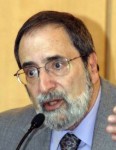By Laurie Baron

SAN DIEGO — While baby boomers expect a Jewish film to deal with Jewish subjects and star overtly Jewish actors and actresses like Woody Allen, Mel Brooks, Richard Benjamin, Goldie Hawn, and Barbra Streisand, viewers born after 1980 are more likely to think of raunchy “bromance” comedies featuring Ben Stiller, Adam Sandler, and Seth Rogen as typical Jewish fare.
No one has produced more of these slacker bonding films than Judd Apatow. Indeed, his recurring Jewish cast members like Jay Baruchel. Jonah Hill, Seth Rogen, and Paul Rudd have been dubbed the “Jew Tang Clan.” Together they have fashioned a new stereotype of Jewish men as slackers who are so busy consuming alcohol, playing computer games, fornicating when they find partners, but masturbating when they don’t, partying, pot-smoking, and watching movies that they never worry about anything serious. They enjoy each other’s company above the pursuit of career and family.
This Is the End is a self-parody of the “Jew Tang” lifestyle set amidst the backdrop of the Apocalypse befalling a Los Angeles ablaze in flames, pocked with sinkholes, and threatened by the Devil seeking out the unworthy souls who remain after the Rapture has whisked the righteous to heaven in glowing blue shafts of light. It finally dawns on the remaining cohort attending a party at James Franco’s home that the disaster that has rudely disrupted their orgy was prophesied in the Book of Revelation.
Since the Book of Revelation is a Christian book, and the Rapture is a Christian concept, why should This Is the End count as a Jewish film? First, Baruchel, Hill, and Rogen represent widely recognized Jewish actors (and Franco is half-Jewish). Second, co-directors Rogen and Evan Goldberg first met each other at Hebrew school in Vancouver when they were studying for their b’nai mitzvah.
But most importantly, the film’s absurd and adolescent humor is peppered with a number of Jewish gags. In one scene, they celebrate a momentary triumph by raising a yarmulke-wearing Franco on a chair. In another Jonah Hill is possessed by the Devil and is spewing forth gibberish. One character thinks he’s speaking Hebrew, but Rogen rebuts this idea by citing the knowledge he gained in six-years of Hebrew school. My favorite scene is when they imitate the ritual from The Exorcist waving a crucifix made out of a spatula and spoon by reciting “In the name of the Lord, Jesus.” Hill looks up and exclaims, “Jesus isn’t the name of the Lord; God is.” Facing Judgment Day, the protagonists realize that sacrificing themselves for the others is more important than incessant carousing. When Franco reaches this point, his friends call him a “mensch.”
The film satirized much of current Hollywood film making. At the beginning, a reporter bluntly asks Rogen why he always plays the same character. The party scene is an exaggeration, but not a misrepresentation, of the excesses depicted in stoner films like Harold and Kumar Go to White Castle. The action and horror sequences draw on the cinematic techniques of summer Blockbusters like The Avengers and low budget scary films like The Blair Witch Project. The most memorable special effect is the well-hung Devil who may hold the record for the largest penis ever to appear on screen―what a schmuck!
Whether is worth spending your time to watch a film that revels in drug use, foul language, scatology, sex, and violence is clearly a matter of taste. Imagine a film that is bloodier than Tarantino’s films, grosser than Sacha Baron Cohn’s, sillier than Mel Brooks’s, and weedier than Cheech and Chong’s, and you should be able to gauge whether you’ll laugh at This Is the End or walk out.
*
Lawrence Baron recently retired from being the Nasatir Professor of Modern Jewish History at San Diego State University. He is the author of Projecting the Holocaust into the Present: The Changing Focus of Contemporary Holocaust Cinema (Rowman and Littlefield: 2005) and editor of The Modern Jewish Experience in World Cinema (Brandeis University Press: 2011). He may be contacted at lawrence.baron@sdjewishworld.com
My mistake.
Yeah, why is James Franco stated as being “half-Jewish” while Jay Baruchel is stated as being “Jewish”? Source? Jay Baruchel is only 1/4 Jewish, through his paternal grandfather, while James Franco’s mother is 100% Jewish. So WTF??
Jay Baruchel’s paternal grandfather was Jewish. His other grandparents were not Jewish. So he is not simply “Jewish”.
Here, for future reference:
Actors of fully Jewish background: -Logan Lerman, Joseph Gordon-Levitt, Mila Kunis, Natalie Portman, Bar Refaeli, James Wolk, Julian Morris, Esti Ginzburg, Kat Dennings, Erin Heatherton, Odeya Rush, Anton Yelchin, Paul Rudd, Scott Mechlowicz, Andrew Garfield, Lizzy Caplan, Emmanuelle Chriqui, Gal Gadot, Robert Kazinsky, Melanie Laurent, Marla Sokoloff, Shiri Appleby, Justin Bartha, Adam Brody, Sarah Michelle Gellar, Gabriel Macht.
Actors with Jewish mothers and non-Jewish fathers -Jake Gyllenhaal, James Franco, Scarlett Johansson, Daniel Radcliffe, Alison Brie, Eva Green, Emmy Rossum, Jennifer Connelly, Eric Dane, Jeremy Jordan.
Actors with Jewish fathers and non-Jewish mothers, who themselves were either raised as Jews and/or identify as Jews: -Ezra Miller, Alexa Davalos, Nat Wolff, James Maslow, Josh Bowman, Ben Foster, Nikki Reed, Ansel Elgort.
Actors with one Jewish-born parent and one parent who converted to Judaism -Dianna Agron, Sara Paxton (whose father converted, not her mother), Alicia Silverstone, Jamie-Lynn Sigler.
For the record, based on an interview I heard with Seth Rogan, Baruchel is only half Jewish. And surprisingly, Danny McBride is too.
Laurie, I think it is remarkable that you have the fortitude to sit through, and review, such dreck.